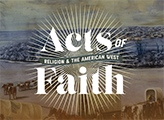




“The dead were many, and their graves were scattered. Some of these places were on high mountains, and some were in deep valleys. Still, the team managed to carry out their mission. With such effort and dedication on the part of the living, surely the dead can rest in peace.”
Religious Liberty
Wong Yung Quy faced a dilemma
when his cousin Wong Wai Toon died in San Francisco at age 36. Family
obligation dictated that he exhume his cousin's bones and send them home to
China. But California legislators had just made bone repatriation more
difficult and expensive in the hope of discouraging Chinese immigration.
Intending to test the new
law, Wong refused to pay the required permit fee and was arrested. His lawyers argued
that the fee placed an undue burden on Wong, thus violating his right to equal
protection under the law and his religious liberty. His cousin, Wong said, “was
a worshipper of the Chinese religion. He believed that his eternal peace and
happiness required that his remains be removed to China.”
The federal court denied
Wong’s claim. The judges ruled the law was not discriminatory—despite its near
exclusive application to Chinese immigrants—and did not unduly obstruct Wong
from performing his religious duty.
Chinese American Christians
also fought to protect their religious beliefs.
They challenged the Chinese
Exclusion laws as an affront to Christian principles.